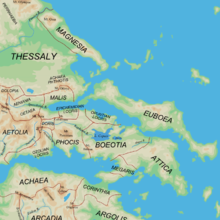Achaeans
As Achaians ( ancient Greek Ἀχαιοί ) or Achaeans in the narrow sense, the population of the Achaia region in the northwest of the Peloponnese was referred to in ancient Greece . Achaia residents also founded some colonies in southern Italy and Cyprus (see list of Achaean cities being founded ). In Homer's epics, on the other hand, the name Achaeans , next to Danaer and Argiver , generally stands for the Greeks who fought against Troy .
history
Originally, the Achaeans settled in Thessaly landscape Phthiotis ; the tribe there is therefore called phthiotic Achaeans. In the course of the Doric migration they were then displaced to Achaia.
The Achaians gave their name to the Achaean League , a league of cities (280-146 BC) that was directed against the Macedonian expansion . The Achaean League temporarily ruled almost the whole of the Peloponnese, until it finally came into being around 146 BC. Was conquered by the Roman Empire .
origin
From the 1920s onwards, the question of whether the Aḫḫijawa mentioned in Hittite written sources could be linked to the Achaeans in Homer's epics , i.e. whether they could be Mycenaean Greeks, caused very heated discussions in research . In the meantime almost all ancient historians, archaeologists and ancient orientalists affirm this. In that case, the term Aḫḫijawa / Achaier would not (only) refer to Greeks from the Achaia region, but either - as in Homer - a collective term for the Greeks of the Mycenaean period, or the name for a larger Mycenaean empire. Also the Ekweš / Aqwaiwascha mentioned at the time of Merenptah and counted among the so-called sea peoples are equated by part of the research with Achijawa and Achaeans.
literature
- Johannes Toepffer : Achaia 1 . In: Paulys Realencyclopadie der classischen Antiquity Science (RE). Volume I, 1, Stuttgart 1893, Col. 156-190.
Individual evidence
- ↑ Achaeans . Brockhaus and dtv, Wiesbaden / Munich 1982. Volume 1, p. 38. ISBN 3-423-03301-0
- ↑ Achaier , Universal Lexicon (web link)
- ^ Gary M. Beckman, Trevor Bryce , Eric H. Cline : The Ahhiyawa Texts. Society of Biblical Literature, Atlanta 2011, p. 3 f.
